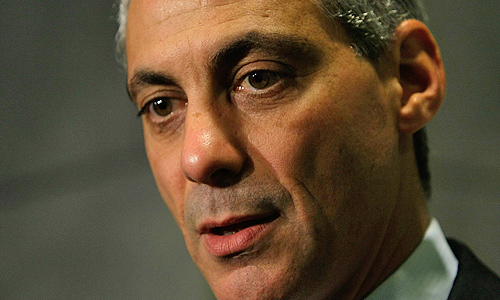Chicago Mayor Rahm Emanuel has declared his intention to make city workers compete with private-sector workers to provide certain city services.
He’s starting with the city’s “Blue Cart Recycling” program, in which the city’s Department of Streets & Sanitation picks up recyclables and yard waste separate from household garbage. The city instituted the program in 1995. It has never lived up to its promise, with low levels of participation and higher costs than recycling programs in other major cities.
Emanuel promises to allow outside contractors to bid on the program. If they can provide the service at lower costs, they will win the work.
Appealing to the People
The concept is called “managed competition.” Emanuel has taken his idea straight to the people, with a recent guest column explaining his thinking in the Chicago Tribune:
“Managed competition shifts the focus from the city’s payroll to the city’s taxpayers, where it belongs,” wrote Emanuel. “The dominant driver in our decision-making should be to provide quality services in the most cost-effective way, not to expand government bureaucracy or maintain a city workforce that costs too much to support.”
“It’s certainly a worthy idea for Chicago to explore,” said Leonard Gilroy, director of government reform at the Reason Foundation in Los Angeles, editor of the Privatization Watch newsletter, and editor of Reason’s Annual Privatization Report, which chronicles privatization efforts at the local, state, and federal levels of government.
“Charlotte [North Carolina] is probably the preeminent example of how to run a good managed competition program,” Gilroy said. “It’s in either its 16th or 17th year. They’ve created a structured process that is sustainable, meaning it has lasted 16 years despite people coming and going in the local political realm.”
Government Workers Win
Gilroy says Charlotte does detailed cost comparisons and has “a solid set of rules for public employees to bid against private sector employees. About 70 to 80 percent of the time, government wins the bids. That’s from federal government experience, Indianapolis, Charlotte, and other places that have done managed competition.
“At the end of the day, even though the public sector is winning a significant percentage, they are doing so only while saving significant costs compared to what they’d be without managed competition,” Gilroy said.
Emanuel’s push for managed competition is a part of a larger effort to restructure how the city operates.
The city has a budget deficit of more than $630 million, which city officials project will keep climbing unless there are significant changes in operations.
Gilroy says managed competition “works best when either the public or private sector could be providing the same thing—waste collection, vehicle fleet maintenance, parks maintenance. You just need guys to sweep streets, pick up garbage, maintain the vehicles. When you’re trying to save money and asking public and private workers to provide the same thing, that can work.”
Steve Stanek ([email protected]) is a research fellow at The Heartland Institute and managing editor of Budget & Tax News.





